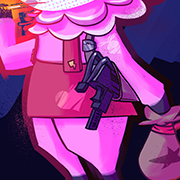|
There are people who wonder if graphics and tech have peaked every generation. Maybe we'll get there someday but not anytime in the next 10-15 years. Certainly processing and authoring power won't peak for a good loooong while either.
|
|
|
|

|
| # ? Apr 19, 2024 03:59 |
|
mutata posted:There are people who wonder if graphics and tech have peaked every generation. Maybe we'll get there someday but not anytime in the next 10-15 years. Certainly processing and authoring power won't peak for a good loooong while either. "Graphics will never get any better." - Me, reading the Quake 3 Arena preview article in Game Informer.
|
|
|
|
And while Ninty operates with some different philosophies, don't believe that they are really that different logistically. They still crunch worse than a lot of western devs.
|
|
|
|
It isn’t really about graphics hitting a peak. It’s about the 80/20. We are well into the era where achieving noticeable visual improvements is a giant, huge, vast, big, scary investment. You can show an average person clips or screens from games that are five years+ apart now and they cannot tell the difference or tell you which is from the more “modern” game. You know what we haven’t really touched much of yet? Emergence / AI. There’s a lot of 80 left to discover and build there. Any of you starting out, that’s where I’d be spending my time if I were in your shoes.
|
|
|
|
On the loot box / gambling / etc. topic from earlier (sorry I was off the grid for holiday) – Just to be clear, I’m not trying to defend or attack a company or F2P or loot boxes or anything. Again, I try to be dispassionate and look at this stuff as an analyst. I’m trying to read the tea leaves and figure out where things are going to be N years from now. From my perspective, this is the path AAA is on: For AAA, the cost of making a game is increasing faster than the return from traditional retail. Digital, which is hitting or close to hitting the tipping point has delayed some of the problem by providing better returns for AAA. That’s only a delay. The cost to make a AAA game will continue to rise, so AAA will have to find a way to keep the wheels on. That cannot be “make different games.” There’s a reason indies and smaller devs can make a living in this business. As anyone who has worked for a big publisher will tell you, there’s no way a Minecraft (or even a PUBG before PUBG) is going to get made by one of the mega-publishers. They understand what they understand and anything that doesn’t fit the mold is doomed. The histories of these companies are littered with attempts to work around this institutional problem – it has not gone well. (Even larger, exceptionally talented developers have problems doing anything other than things very close to what they have already been successful with.) You cannot say “just make cheaper games so you don’t have to do other stuff.” You have a 2000 person team working on your next mega shooter. Across the street, your competitors have a 2000 person team working on their next mega shooter. You’re going to shrink down to a “tiny” 200 person team? Your competition will keep their 2000 person team and crush you, both in quality / magnitude of their releases and in mindshare since they’ll drop content and sequels constantly and you’ll be trying to hit big two-three year pops. Also, if you even suggest this, your major stockholders will set you on fire. F2P / lootbox / etc. sure as hell looks like a great way to make a profit commensurate with the cost to make the game from their perspective. It seems to be working amazingly well overall, recent controversy aside. I would expect to see it flourish further across AAA space. I would not expect this to be constrained and for some AAA games to not have it. Once it works somewhere in their lineup, the pressure will be on to do it in any game coming out of that publisher. I would not expect government regulation to do anything. If anything happens, it’ll be as effective as COPPA, which no kid under 14 can figure out a way around. There are places that have regulations already. These places still have the same business models, slightly tweaked. Hey, we do not sell loot boxes anymore – but we do sell vanity bits that come with free, random items. The only way it is modified is if players shift their spending to games with a different business model. So, IMO, whatever plans you are making, if they involve AAA games, I’d expect them to also involve these business models until there’s some change in the fundamental landscape.
|
|
|
|
Mother, how do you feel about the Games as Service/seasons model, as a business practice? What are the pros/cons compared with the lootbox approach?
|
|
|
|
Discendo Vox posted:Mother, how do you feel about the Games as Service/seasons model, as a business practice? What are the pros/cons compared with the lootbox approach? Why are loot boxes mutually exclusive with service games? Where do you think they came from?
|
|
|
|
Mother posted:F2P / lootbox / etc. sure as hell looks like a great way to make a profit commensurate with the cost to make the game from their perspective. It seems to be working amazingly well overall, recent controversy aside. I would expect to see it flourish further across AAA space. Do you think it's inevitable that every AAA game is going to have RNG monetization mechanics within a few years, single-player and multiplayer alike? What I wonder is mostly about big single-player titles that, right now, mostly stick with a more straightforward DLC approach. Games like Assassin's Creed Origins offer microtransactions to buy in-game currency, but aren't necessarily balanced around it, so you can have a well-balanced and satisfying experience just paying the upfront price. They also sell costume DLC on a regular basis, and of course the usual campaign DLC that most big single-player games get. Should we expect to see that sort of thing, the "post-launch support" model where you buy more actual content as it's released, fall away in favor of loot boxes? Or do you think loot boxes are likely to remain in the realm of the big AAA multiplayer games, the Call of Duty/Battlefield/etc. realm? (Loot box microtransactions have obviously already shown up in single-player AAA games like Shadow of War, obviously, but I mean more pervasive and with the game more thoroughly balanced around it.)
|
|
|
|
What year would you consider to be the golden age of video games? I feel like it was between 1998 to 2001 as a consumer. That would be around the end of the N64-Playstation and the beginning of PS2-Xbox-Gamecube-Dreamcast. I would also say that around 2008 was the decline or when games started to get so big that paid DLC Horse Armor started to become mainstream and every big game started to feel the same or a sequel. Steam was released in 2003. It feels like 1998-2001 had an insane amount of risks taken and IPs created. Even today AAA publishers are relying on these 20 year old IPs because they worked back then. Only now it takes over ten times the amount of people to make, what some would say, the same game but with brighter lights and louder whistles. Here are some cherry picked favorites of mine. 1998: Marvel vs. Capcom, Final Fantasy Tactics, Starcraft, Unreal, Banjo-Kazooie, Rainbow Six, Parasite Eve, Pokemon, Grim Fandango, Half-Life 1999: Tony Hawk, Silent Hill, Super Smash Brothers, Mario Party, Soulcalibur, Quake 3 Arena, 2000: Diablo 2, Deus Ex, Counter Strike, The Sims, Red Alert 2, Majora's Mask 2001: Grand Theft Auto, Metal Gear Solid 2, Tony Hawk 3 joats fucked around with this message at 06:29 on Nov 29, 2017 |
|
|
|
I mean there have been tons of great games every generation, I actually think recent years have been pretty fantastic. This year alone we've gotten Persona 5, Breath of the Wild, Super Mario Odyssey, Cup head and Nioh off the top of my head - I'm sure all of those will be remembered fondly for quite a long time. I feel like the "golden age" will be whenever you had the most time to get into games. I guess if I had to pick one maybe the PS2 era? I have way more PS2 games than anything else. However, not all of them I really am dying to go back to, or have aged all that well. None of them held my attention for as long as something like Bloodborne or The Wonderful 101 has, aside from God Hand, aka The Best Game Ever Made.
|
|
|
|
CodfishCartographer posted:I mean there have been tons of great games every generation, I actually think recent years have been pretty fantastic. This year alone we've gotten Persona 5, Breath of the Wild, Super Mario Odyssey, Cup head and Nioh off the top of my head - I'm sure all of those will be remembered fondly for quite a long time. Maybe I should rephrase the question. As a consumer that would be my favorite age, but as a developer what period would be the golden gaming development age? Or best time working in the field? I know that for my field, 2008 was a terrible time to be in architecture (lots of layoffs and few openings), but it has bounced back immensely. Maybe I have the wrong perception that it isn't the best time to be a game developer right now? joats fucked around with this message at 07:34 on Nov 29, 2017 |
|
|
|
On the business side, it's really rough right now. If you open a studio right now it's a HUGE longshot whether you'll still be open in 2 years. Expenses have never been higher, the market has never been more saturated, and margins have never been slimmer. I don't know for sure, but I wanna say that that turn of the century era you're talking about seemed pretty great business-wise. Just getting a box on a shelf put you on pretty equal marketing footing with your competitors and games could sell to tiny niche audiences and still be a company-carrying success. As far as PRODUCTION goes, we've never had better, more varied, more powerful, or more accessible tools and resources than we do now. The act of making games is far and away the best it's ever been. If I had to declare a golden age for devs, though, I'd say it was the 80s when every idea was new and fun, jank didn't matter, and nerds in high school could write games in the evenings and sell them mail order from home and drive Ferraris to their first year at college.
|
|
|
|
Discendo Vox posted:Mother, how do you feel about the Games as Service/seasons model, as a business practice? What are the pros/cons compared with the lootbox approach? I’m personally a little love / hate with it, both as a dev and a player. As a dev, it allows you a lot of room to maneuver. You have something rolling and proven. You can count on players being there and being able to stay in business. So, you can take some chances or work on big things that you might not be able to tackle when working on a game with more of a “point release” model. (Obviously, publishers love the idea of live games for stable revenue, especially if they are public companies.) It’s also a nice (or can be a nice) relationship. You grow a pool of players who love your game. They stick around. They’re playing every day. You’re talking with them. It’s fun. Same time, be ready to be your “living” game. It will absorb a lot of time and people. You’ll have to deal with burnout. It’ll be harder to make other games, both from schedule and mindshare standpoints, which will worsen as love for the game becomes part of your hiring process (which it invariably will). If you want to work on a few different game or a diversity of ideas, a successful live game can be a burden. There will be more of this in the future -- like F2P / lootboxes / etc., it's another way to address higher dev costs. It will evolve too. There are a lot of franchises / release structures that are effectively live games without actually being "live" -- these tend to be the ones I prefer. With the current state of things, the Number One issue any game faces is visibility and a live game (or effectively live game) is a good way to build a community.
|
|
|
|
Harrow posted:Do you think it's inevitable that every AAA game is going to have RNG monetization mechanics within a few years, single-player and multiplayer alike? Anyone here who has been in a conference room at a AAA pub's office will tell you that whoever they were sitting across from said, at some point, "what about current hot thing, what are you doing for that?" It doesn't matter what game you are making or if it fits or not. 3D, multiplayer, persistent characters, online, physics, mobile, "three screen", leaderboards, tournaments, microtrans, VR, HD, 60Hz, 4k, F2P, mod-support, Twitch, etc. You're making a pixel art deep story RPG? Cool, cool. Hey, man, 4k is hot. And have you played this PUBG thing? Competitive online is hot. You guys go get support for 4k and competitive online in your game. I 100% expect that every game winding through the process at a big pub has the topic surfaced during review meetings. That doesn't mean it will be in every single game made in the future, but as long as it is making money, they're going to ask every game about it.
|
|
|
|
Mother posted:Anyone here who has been in a conference room at a AAA pub's office will tell you that whoever they were sitting across from said, at some point, "what about current hot thing, what are you doing for that?" It doesn't matter what game you are making or if it fits or not. 3D, multiplayer, persistent characters, online, physics, mobile, "three screen", leaderboards, tournaments, microtrans, VR, HD, 60Hz, 4k, F2P, mod-support, Twitch, etc. Yeah, that makes sense. And I know that companies have somewhat of an obligation, if they're publicly traded, to at least investigate ways they could increase profitability. Loot boxes aren't nearly poisonous enough to be an immediate "no we're going to lose money" proposition, and I doubt they'd ever get there. What I hope is that we never reach a point at which it becomes standard for single-player games to build their in-game economy and progression around microtransactions (of any kind). I'm totally fine with microtransactions as cool extras, and enthusiastic about new-game-content DLC packs, but I worry that one day it'll be accepted for a game to be what people feared Shadow of War would be: that you're either going to have to grind your rear end off or buy loot boxes to see the endgame. (That is apparently not how it turned out, but it's a line I could easily see being crossed.)
|
|
|
|
Every single open world game has had to grapple with "Well what about Breath of the Wild?" this year.
|
|
|
|
More like what about Tom Clancy’s Ghost Recon: Wildlands.
|
|
|
|
mutata posted:Every single open world game has had to grapple with "Well what about Breath of the Wild?" this year. There were a couple moments when I was playing through Zelda and Horizon Zero Dawn and I thought to myself, "Thank God I don't have to worry about trying to compete with this anymore." I think if I was still at my old job while I was playing through those games I would've had an anuerism. Working on open world games was stressful enough before those two games arrived.
|
|
|
|
What's surprising to me is that Assassin's Creed Origins kinda pulled it off, weirdly enough, and I wouldn't have expected that from an Ubisoft open world game. It's not quite as amazing to explore as Breath of the Wild and the moment-to-moment combat gameplay isn't nearly as good as Horizon Zero Dawn, but it all holds together really well and managed to dodge the usual open world wandering fatigue I usually get. I'd love to see some sort of analysis about what those three games do that make their worlds fun to explore just for the hell of it. That's less true in Horizon, I think, but in the others, I'll happily just run off in a direction and explore. In Breath of the Wild, I know a major aspect is that the towers are a very active thing--you actively mark things on your map with your Sheikah telescope rather than filling the map with icons automatically, which makes a huge difference is making you feel like an explorer--but I'm sure there are a lot of design subtleties I didn't notice at work there.
|
|
|
|
Harrow posted:What's surprising to me is that Assassin's Creed Origins kinda pulled it off, weirdly enough, and I wouldn't have expected that from an Ubisoft open world game. It's not quite as amazing to explore as Breath of the Wild and the moment-to-moment combat gameplay isn't nearly as good as Horizon Zero Dawn, but it all holds together really well and managed to dodge the usual open world wandering fatigue I usually get. In an interview with one of the Guerrilla dudes they mentioned studying Skyrim in the transition to open world and the so-called “forty second rule,” that you’re never more than forty seconds away from some point of interest on the map. Something you notice about the design of good open world games is that they only present the illusion of breadth, when in reality their proportions are quite compact. Horizon is supposed to take place across the whole expanse of Colorado and Utah but you can run from the Sacred Lands to Sunfall in under 10 minutes. Someone once calculated the entire combined landmass of the Eastern Kingdoms and Kalimdor in WoW to be about the size of Manhattan. The real world is full of a whole lot of boring empty space, and good open worlds keep you motivated to explore from point to point.
|
|
|
|
exquisite tea posted:In an interview with one of the Guerrilla dudes they mentioned studying Skyrim in the transition to open world and the so-called “forty second rule,” that you’re never more than forty seconds away from some point of interest on the map. Something you notice about the design of good open world games is that they only present the illusion of breadth, when in reality their proportions are quite compact. Horizon is supposed to take place across the whole expanse of Colorado and Utah but you can run from the Sacred Lands to Sunfall in under 10 minutes. Someone once calculated the entire combined landmass of the Eastern Kingdoms and Kalimdor in WoW to be about the size of Manhattan. The real world is full of a whole lot of boring empty space, and good open worlds keep you motivated to explore from point to point. I wonder if Breath of the Wild followed a similar rule. It feels like there's a lot more empty space, but it never felt particularly boring to run around. It's probably helped by the fact that running around as Link just generally feels good, so a little bit of walking through some empty space feels like some enjoyable downtime. But you also never go too long without at least seeing something interesting. I might just not have noticed BotW having a similar density of points of interest because it doesn't mark them on your map automatically--that's probably the biggest difference in design there, and something with advantages (exploration feels really organic) and disadvantages (I probably walked right by a lot of things).
|
|
|
|
joats posted:What year would you consider to be the golden age of video games? I feel like it was between 1998 to 2001 as a consumer. That would be around the end of the N64-Playstation and the beginning of PS2-Xbox-Gamecube-Dreamcast. I would also say that around 2008 was the decline or when games started to get so big that paid DLC Horse Armor started to become mainstream and every big game started to feel the same or a sequel. Steam was released in 2003. It feels like 1998-2001 had an insane amount of risks taken and IPs created. Even today AAA publishers are relying on these 20 year old IPs because they worked back then. Only now it takes over ten times the amount of people to make, what some would say, the same game but with brighter lights and louder whistles. I would argue strongly that gaming continues to get better and the golden age of gaming is current year. What I personally consider to be the best game ever made was built in 2015 (Ori and the Blind Forest), but using just that year, lets go over a the list of Really Good Games. We have: Ori and the Blind Forest The Witcher 3 Fallout 4 Metal Gear Solid V Super Mario Maker Splatoon Rise of the Tomb Raider Rocket League BloodBorne Shovel Knight Undertale Grand Theft Auto V Journey Uncharted 4 Kerbal Space Program And those are just the ones I can remember. This is also to not discount the seemingly endless number of other solid titles that have smaller budgets, more niche appeal, or maybe weren't home runs, but were pretty good like... Duck Game Until Dawn Tales from Borderlands Axiom Verge Her Story Cities Skylines Mortal Kombat X Downwell Arkham Knight Heroes of the Storm SCII: Legacy of the Void Xenoblade Chronicles X Just Cause 3 Halo 5: Gaurdians Rainbow Six Siege Assassin's Creed, Syndicate ...And the list goes on. So many great games come out every year these days, appealing to so many different people. There is now room in the market for both small indie titles to appeal to the tastes of a few thousand people, as well as monster AAA titles that cost north of $50m to make. In the modern era, you can find almost anything you want and there is probably some version of that thing that's pretty good. Count the number of 'Fantastic' and 'Great' games in the early 2000s and you are left with a much shorter list. Beyond that, the industry is a lot better at things like game distribution, UI design, physical interface design, and general UX-y things. Network connectivity and what games have done to leverage the Internet is miles ahead of where we were 15 years ago. All the supporting structure around games is just so much better. Canine Blues Arooo fucked around with this message at 00:41 on Nov 30, 2017 |
|
|
|
Harrow posted:I wonder if Breath of the Wild followed a similar rule. It feels like there's a lot more empty space, but it never felt particularly boring to run around. It's probably helped by the fact that running around as Link just generally feels good, so a little bit of walking through some empty space feels like some enjoyable downtime. But you also never go too long without at least seeing something interesting. There’s a youtube video I watched a while back, which is one of my favorites. It talks about how with Ubisoft-style open world games, and games like Skyrim, adding all the little icons on your minimap / radar automatically kills a lot of the exploration. It turns “oh cool I wonder what this cave is?” into “oh, another cave to clear, whatever”. Instead of getting the cool feeling of exploration, it turns into a checklist of chores to do. When you get on top of a tower (uuuuuugh) you don’t actually look around and go “hey there’s a cool looking cave over there, and is that a campsite off that way? I didn’t know there was a fortress over there, I should go see what’s up with that!” Instead you climb up, it barfs a bunch of icons on your map that may as well be a literal checklist of “things to do”. (if anyone knows what video i’m talking about, please link it here, I searched a ton and wasn’t able to find it) e: this isn't the video, but it touches on a similar topic: https://www.youtube.com/watch?v=FzOCkXsyIqo
|
|
|
|
CodfishCartographer posted:games like Skyrim, adding all the little icons on your minimap / radar automatically kills a lot of the exploration. It turns “oh cool I wonder what this cave is?” into “oh, another cave to clear, whatever”. Then again, all of the combat & dungeon-related stuff feeling super-samey was a problem with Skyrim in general. Maybe it's because I'm used to the more directed experience of JRPGs, but it left the game feeling less like an RPG and more like a town quest simulator(not a bad thing in itself) where you were occassionally sent to kill Interchangable Level-Scaled Enemy Set Q in Identical Cave 546 for Macguffin 8(definitely a bad thing).
|
|
|
|
http://www.blog.radiator.debacle.us/2017/10/open-world-level-design-spatial.html This blog post goes into some detail about BotW's map and how it prevents you from walking in a straight line to anything. Further, the scale of hills and landmarks is specifically set so that you can see interesting locations but can't get any real information on them without walking to them (I like the tower example: you can see the top, but you don't know what's at the base, so finding the tower is really two discoveries in one location).
|
|
|
|
joats posted:Maybe I should rephrase the question. As a consumer that would be my favorite age, but as a developer what period would be the golden gaming development age? Or best time working in the field? I think this is hugely dependent on what kind of development you are doing. If you are an indie, there's never been a better time to be a developer (well, maybe like 2 or 3 years ago was better, but the general point stands), because you literally couldn't get your games in front of people effectively without low barrier-to-entry digital distribution, and toolsets were insanely expensive. For companies that do work-for-hire for big publishers, though, the market has really dried up. For phone game developers, the early days of the app store were probably better than now. For console game devs, the PS3/360 generation was really rough from a technical point of view because the gap between PC and consoles was close enough that you could reasonably try to make cross platform PC/console games, but far enough away (especially in terms of RAM) that actually getting stuff running on them could be a nightmare. Basically, it's always going to be an awesome time for someone and a lovely time for someone else, I think.
|
|
|
|
Haifisch posted:I'd argue that Skyrim had the bigger problem of all its caves being effectively identical, so you only got the cool exploration feeling the first or second time you went into one. Every other time it was "oh, this again." Same went for all its other dungeon types. So to kiiiind of throw you under the bus to make a point about a previous conversation, this is one of Skyrim's main criticisms and it is because it was made by a team of 70 people (plus outsourcing). The dungeon art team in particular (dungeon here being any interior space like caves, ruins, etc) was 2 people, I believe. Skyrim made by 70 people is a feat in and of itself but repetitive samey caves made from modular asset packs is what smaller (aka sustainable) teams can do realistically and games DO get dinged for it. Bethesda is an outlier here and they pulled off an amazing feat with Skyrim so it hasn't affected their bottom line, but stuff like that gets called out and it makes a difference for games with less IP and marketing power.
|
|
|
|
RE: Game economics talk (read: loot boxes and the rising costs of game development), this blog post sums everything up quite nicely. Anyone that was involved in that conversation earlier, or is just curious about it, should give it a read: https://www.raphkoster.com/2017/11/27/some-current-game-economics/
|
|
|
|
Gearman posted:RE: Game economics talk (read: loot boxes and the rising costs of game development), this blog post sums everything up quite nicely. Anyone that was involved in that conversation earlier, or is just curious about it, should give it a read: Christ, that's a bleak read. The comments actually made it worse, too, and not in the way comments usually do. One commenter asked about the film industry--how we see massive commercial films that make huge profits get made, and also smaller films that make smaller profits, often distributed by the same companies. And Koster's response to that makes a ton of sense: creatives have power in Hollywood. They don't in games. And the way games are made, individual creatives are much less likely to have a huge impact in the first place, barring a few well-known auteurs like Yoko Taro or Hideo Kojima. There's no real drive to do the kinds of, as Koster puts it, "one for you, one for me" deals we see in Hollywood, where creatives work on commercial projects and, as part of the deal, secure distribution for their more personal projects. That isn't the way games went, and the makeup of a game development team means that it kind of can't be. It's kind of weird that 2017 has been such an incredible year for single-player AAA games, both Western-developed and Japanese-developed, and yet I'm leaving the year extremely pessimistic about the future of games.
|
|
|
|
Perhaps one reasons films can function with also funding small niche productions is that consuming a film is a one-shot process, you sit down for 2 hours and then you're done. You can consume several films in one day. Meanwhile games tend to monopolize your time, you are more likely to play the same game all day (your free time) for an extended period of time before you put it down for something else, than you are to play a little of many games. So the game that first gets the attention of the consumer will take all the attention, leaving nothing for the second place, but the same consumer would likely view several films in some priority order.
|
|
|
|
|
Yeah, that's a big part of it. Koster also notes that movies are much easier to monetize after the fact than games--there are a lot of ways to get more money from people who want to watch the film in contexts other than the theater. Once its theatrical run is over, you've got DVD/BluRay sales, streaming deals, TV deals, a bunch of ways to merchandize the big commercial ones even before they're released, all of that. None of those things really exist for games. Looking back, the height of the preorder bonus/deluxe edition craze seems positively benign, and not all too different from the latest Star Wars movie selling toys of its new mascot characters months before the movie hits theaters. It's a way to get more money out of the people who are already sold on your product. Right now, it looks like Sony, at least, still sees value in high-budget single-player games that basically function like a combination prestige game and tech demo. Uncharted 4 and Horizon Zero Dawn both have very limited monetization beyond the purchase price--a vaguely popular online mode with some microtransactions, and a single DLC pack, respectively--and are high-budget, first-party productions with a focus on polish and quality. And they've both been profitable, obviously, but not loot box multiplayer game profitable. But the difference, I expect, is that they helped move PS4s. Ubisoft's single-player games have microtransactions, but they're about as benign as they can be. Bethesda's been doing a fantastic job of publishing single-player games recently, with the Dishonored games, the new Wolfenstein games, and Doom. Publishers who see value in those kinds of experiences still exist. But how long can that last? Are the Assassin's Creeds of the world unsustainable? Should we expect to see that model of game dwindle away in favor of pseudo-MMO games, hybrid single-player/multiplayer things, monetized as far as they can be? That's something that came up in the Reddit thread Koster linked to in the comments: the traditional MMO might be a basically-dead genre, but a lot of the big games making piles of money right now are essentially a new generation of MMO. Games like Pokemon GO might not look like an MMO compared to World of Warcraft, but, well, it has a persistent player identity, persistent progression, multiplayer, and a focus on long-term "forever game" service models. How long can we expect games like Horizon, Uncharted, Prey, or even Assassin's Creed to be worth making? Harrow fucked around with this message at 05:39 on Nov 30, 2017 |
|
|
|
I’m expecting one of the next Games-as-a-service inventions to be games where you’re expected to buy lots of microtransactions and season pass dlc but are only expected to play sparingly. It’s probably already a big mobile strategy.
|
|
|
|
One of the things I see from "whales" really fascinates me. People talk about how much money they spend on their game of choice and, when questioned, shrug and say "it's my hobby. It's what I spend money on." Raph Koster posted in one of the comment threads that people outside of gaming frequently spend hundreds or thousands of dollars a year on their hobbies, so it shouldn't be that unusual. The shift, I think, is that right now a lot of us tend to see video games as our hobby, while the growing number of F2P "whales" see a specific game as their hobby. It's a big difference in perspective and something I'm sure publishers would love to exploit. I probably do spend $1000 a year or so on games, but I spend that on a bunch of games, not one or two. Am I the kind of customer who's going to become increasingly irrelevant, compared to the one who spends that same amount of money per year, but spends it on one or two games that provide constantly-updated content and services? (This is all coming across as very doom-and-gloom, but I think there's also a big element of me just being fascinated by the whole phenomenon. As the hobby I enjoy morphs around me to not really be for me anymore, at least I'll find the process interesting  ) )TF2 HAT MINING RIG posted:I’m expecting one of the next Games-as-a-service inventions to be games where you’re expected to buy lots of microtransactions and season pass dlc but are only expected to play sparingly. It's 100% a big mobile strategy. I think a ton of mobile games are meant to be played in short bursts and encourage microtransactions along the way. It works because you can either grind for ages to progress a gacha game--really long play sessions that you don't get much progress out of--or you can pay to fast-forward your progress and instead have shorter, more satisfying play sessions. I wonder how it'd translate to the AAA space, though. Those gacha games are fundamentally single-player, or, at least, their multiplayer is asynchronous. The big multiplayer games currently making loads of money on loot boxes rely on their size to be relevant. They're not worth playing if it's not super easy to get a match because fuckin' everybody is playing. For now, at least, games like Call of Duty benefit when players stick around and play a lot of games, because players are themselves a significant portion of the content. Right now, I think we're conditioned to want story and a really smooth experience in our AAA single-player games, and chopping that up into short play sessions strung together with microtransactions wouldn't go down so well. Or maybe not--I know it's pretty common now for people to be drawn to games where you can play for a short period of time and still make some progress, so it might not be as far away as I'm guessing. Harrow fucked around with this message at 06:03 on Nov 30, 2017 |
|
|
|
Bungie were talking about wanting people playing around the release of new content and feeling free to take breaks in between with Destiny 2. It’s just an excuse because they hosed up on the amount of content available but it’s not impossible that they could be successful. I bet a lot of developers would be glad to bring in money but cut back on server costs and content creation. edit: World of Warcraft is notorious for letting the game rot for long periods of time between the release of the final raid and an upcoming expansion. People hate it but a lot of people keep subscribing during these dry months. LIVE AMMO COSPLAY fucked around with this message at 06:10 on Nov 30, 2017 |
|
|
|
Hell, that's basically how Guild Wars 2 works, as far as I can tell. Players come back in waves for big content drops, then likely leave when they run out of stuff to do while a smaller core of players who love to grind stay (and buy premium currency). ArenaNet put a ton of work into their megaserver model so that it's unnoticeable. For everything other than the big server vs. server PvP, the server you play on doesn't matter--players from all servers get dumped into the same maps, with more instances opening up as necessary to accommodate the population. So long as there's enough player population to fill a couple instances of each map, the game world's always going to feel populated. I should clarify that I don't mean that the population drops off a cliff frequently or anything, but the game is definitely designed to provide a smooth experience and player populations fluctuate pretty widely, and it works because the game doesn't have a subscription. The players who stick around are the ones who are going to buy the most premium currency anyway.
|
|
|
|
It's worth noting that mobile F2P games are designed to be played in short bursts because they're phone games. Short play sessions just work better for them, because long play sessions are impractical and uncomfortable. If a game is designed with short play sessions in mind, it will be much easier to play when on the bus, when on the toilet, when waiting in line at the supermarket, etc. Playing for a long time will just hurt your eyes, probably hurt your hands, and will obliterate your battery. I kind of doubt shorter play sessions will become the norm for console games, because when you play one it's more of an event - you sit down on your couch, turn on the TV, and sit around to play for a while. Short play sessions in this case are a burden, because it's a fair bit of effort to even get the game going in the first place - if you can only meaningfully play for 10-15 minutes at a time, why bother? Short play sessions for mobile also can help make playing the game into a habit, and every mobile game developer wants "playing our game" to become a habit and part of a player's cell phone checking routine.
|
|
|
|
Gearman posted:RE: Game economics talk (read: loot boxes and the rising costs of game development), this blog post sums everything up quite nicely. Anyone that was involved in that conversation earlier, or is just curious about it, should give it a read: This is an OK article, but there are a few things I take issue with. I'm not a 20 year vet of the industry - I've been in the games industry for about 5 years, and I'm just a dude who builds tools. I'm not privy to financials. My read on the industry isn't that games are too expensive too make, it's that most studios are very mediocre at making the 'game' part of the game. From that stems issues with retention and engagement, which translate to financial issues over the long term.
|
|
|
|
On the other hand, whether you fork over $60 for a mediocre game and play it for 15 hours, or a good game and play it for 150 hours, if there are no microtransactions, season passes, or subscriptions, the publisher has made just as much on the shorter lasting game. If you spend shorter time on each game, chance is you'll get the next game sooner.
|
|
|
|
|
nielsm posted:On the other hand, whether you fork over $60 for a mediocre game and play it for 15 hours, or a good game and play it for 150 hours, if there are no microtransactions, season passes, or subscriptions, the publisher has made just as much on the shorter lasting game. If you spend shorter time on each game, chance is you'll get the next game sooner. Yes, and in the immediate term, that makes a lot of sense. If you want a studio to stick around though for more than a few years, it might be wise to actually build a good game.
|
|
|
|

|
| # ? Apr 19, 2024 03:59 |
|
Canine Blues Arooo posted:This is an OK article, but there are a few things I take issue with. The truth is that making games IS very hard. There is no formula, no blueprint, and no real guide on how things should be done. When you're making a tool, you know who's going to be using it, what it should do, and you can probably figure out how it should be built. When you're building something like a side quest you have wrangle with that terrible question of "Is it fun?". "Fun" is an incredibly nebulous thing and every person you ask will likely give you a different answer. And that's not even accounting for difficulty tuning, writing, art, voice acting needed for it, rewards etc. I highly recommend re-reading the OP, as it contains Liz England's very fantastic "Door Problem". It gives you an idea of how even something like implementing a door requires a lot of thought from just about every developer on the project. And that's just a single door. Most studios aren't really mediocre, in fact if they exist as a studio, they are probably pretty good, it's just that making games of any significant size is an extraordinarily difficult endeavor.
|
|
|























